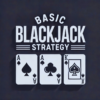How to Play Blackjack?
How to Play Blackjack? – For novices and experts alike, blackjack remains a classic. In essence, aim for a card total close to 21 but never over. The perfect balance of skill and luck!
Blackjack has a rich history and is renowned for its strategic gameplay, captivating players worldwide. The objective of the game is to hold a hand with a higher value than the dealer’s, without going over 21. With its thrilling dynamics, this game has remained a favorite among gamblers for decades, both in online and brick-and-mortar casinos.
| Casino | Live Bonus | Action |
|---|---|---|
| VulkanBet | $/€2,000 | CLAIM |
| Casino500 | $1,000 | CLAIM |
| Playfast | $/€500 | CLAIM |
| EvoBet | $/€500 | CLAIM |
| CampeonBet | $/€500 | CLAIM |
Unlocking the Potential: Skillful Play and Strategic Decisions
Not only is blackjack easy to learn, but it also offers players the opportunity to utilize their skills and expertise to outsmart the house and potentially win big. In this article, we delve into the intricacies of blackjack, from the basic rules to advanced strategies and insider tips and tricks, equipping you with the knowledge to elevate your gameplay and master the art of blackjack.

An Overview of the Game and its Popularity
Blackjack, also known as 21, holds a distinguished position as one of the most popular casino games worldwide. Its widespread popularity can be attributed to its simple and straightforward gameplay, as well as the player’s ability to use strategy and skill to gain an advantage. Unlike games of pure chance, such as slot machines, blackjack empowers players to make decisions that directly impact the outcome, enhancing the overall engagement.
Blackjack is available in both land-based and online casinos, and variations of the game are also played in charity casino nights or home games. It enjoys a global presence in the majority of casinos. In addition to recreational players, professional gamblers are drawn to blackjack, utilizing advanced techniques like card counting to increase their winning potential. Various blackjack variations, such as Spanish 21, Vegas Downtown, and Atlantic City, add further diversity and complexity to the game, influencing the player’s expected return and strategy choices.
Understanding the Objective of Blackjack
The primary objective of blackjack is to surpass the dealer’s hand value without exceeding 21. Each round begins with the player receiving two cards, and their combined value determines the strength of their hand. For instance, if a player receives a 9 of diamonds and a 5 of spades, their total hand value is 14.
After receiving their initial cards, players must decide whether to “hit” and receive another card or “stand” and maintain their current hand. The goal is to get as close to 21 as possible without exceeding this limit. If a player’s hand value exceeds 21, it results in a “bust,” leading to an automatic loss, regardless of the dealer’s hand.
Once all players have completed their turns, the dealer reveals their hole card and plays their hand following specific rules. These rules may vary across casinos and will be discussed in detail later. If the dealer’s hand exceeds 21, all remaining players win the round. Otherwise, the hands are compared, and the player with the highest value wins.
It’s important to note that winning can be achieved through means other than surpassing the dealer’s hand, such as obtaining a “blackjack” (an Ace and a 10-point card) or achieving a hand with 21 points using five or more cards (known as the 5 card trick). Blackjack requires players to employ strategy and skill, making informed decisions based on their hand and the dealer’s actions. By mastering the rules and strategies, players can enhance their chances of winning and enjoy an exhilarating gaming experience.
Card Values in Blackjack
Understanding the values of the cards is crucial for effective blackjack play. The card values are relatively straightforward, with numbered cards (2-10) being equal to their face value. For example, a 2 of hearts holds a value of 2, and a 7 of spades is worth 7 points. Face cards (jack, queen, and king) all have a value of 10 points. The ace, however, is unique, as it can be valued at either 1 or 11, depending on which value benefits the player’s hand.
When calculating the hand value, players should aim to get as close to 21 as possible without going over. The flexibility of the ace, which can be counted as either 1 or 11, offers players greater maneuverability in their decision-making. For instance, if a player is dealt an ace and a 10-point card, they have achieved a “blackjack” and automatically win, unless the dealer also has a blackjack.
It’s important to consider that the dealer follows specific rules regarding the ace’s value. Depending on the house rules, if the dealer’s total exceeds 21, they will count the ace as 11. If counting it as 11 would cause the dealer’s hand to exceed 21, they will change the ace’s value to 1. This rule, known as “busting,” ensures fair play and adds an extra layer of strategy to the game.
Understanding the card values allows players to make informed decisions about their gameplay, maximizing their chances of success.
The Dealer’s Play
In blackjack, the dealer adheres to a predetermined set of rules that dictate their actions during each round. These rules ensure a fair and balanced game for both the player and the house. At the start of a round, the dealer deals two cards to each player, as well as themselves. One of the dealer’s cards is face-up, while the other remains face-down, known as the “hole card.”
Once the initial dealing is complete, players take turns making their decisions, guided by basic strategy or advanced counting techniques. Once all players have finished their turns, the dealer reveals their hole card and plays their hand according to the established rules.
The most common rule is that the dealer must stand on a hand with a value of 17 or higher and hit on a hand with a value of 16 or lower. The dealer continues to hit until they reach a value of 17 or higher. If the dealer’s hand exceeds 21, all remaining players automatically win. In certain variations, the dealer may stand on a soft 17, which consists of an ace and a 6. It’s important to consider this rule when selecting a table, as it can affect the house edge.
It’s essential to note that the dealer’s play is predetermined and independent of the players’ decisions. Even if all players bust, the dealer will still play their hand according to the house rules. Understanding the dealer’s play is crucial for making informed decisions and maximizing the chances of winning.
Betting and Payouts
Betting and payouts play a vital role in the blackjack experience. Before the game begins, players place their bets by positioning chips in the designated betting area on the table. Once the bets are placed, the round commences.
The betting amount varies depending on the casino and table, with specific tables imposing minimum and maximum bet limits. Depending on the casino and table rules, players may be allowed to use betting systems like progressive bets or negative progression techniques, which aid in managing their bankroll or capitalizing on winning streaks.
Regarding payouts, blackjack typically offers some of the most favorable odds in a casino. The standard payout for a winning hand is 1:1, meaning that if a player bets $10 and wins, they receive an additional $10 on top of their original bet. However, if a player obtains a blackjack (an Ace and a 10-point card), the payout is typically 3:2. For example, if a player bets $10 and achieves a blackjack, they receive an additional $15 along with their initial bet.
It’s also worth noting the insurance bet, an optional side bet that can be placed when the dealer’s up card is an Ace. This bet pays out at 2:1 if the dealer has a blackjack. However, it’s generally not recommended, as it increases the house edge and is beneficial in only a small percentage of games. Additionally, some casinos may offer a “surrender” option, allowing players to forfeit half of their bet and lose the hand when the odds are unfavorable.
In summary, blackjack offers players the opportunity to place strategic bets and potentially win significant payouts. Understanding the betting rules and payout structures is crucial for making informed decisions and maximizing the chances of winning.
Basic Strategy Chart: A Valuable Tool
The basic strategy chart is an invaluable tool that assists players in making informed decisions during a blackjack game. The chart is based on statistical analysis and provides players with the optimal move for any given situation. Utilizing a basic strategy chart involves finding the row corresponding to the player’s hand and the column corresponding to the dealer’s up card. The intersection of these two values offers the recommended move.
The basic strategy chart typically suggests four possible moves: hit, stand, double down, or split. “Hit” entails requesting another card, “stand” involves maintaining the current hand, “double down” consists of doubling the bet and receiving one more card, and “split” allows the player to separate a pair of cards and play them as separate hands.
It’s important to acknowledge that the basic strategy chart is based on statistical analysis and does not account for the player’s personal preferences or the specific table rules. Nevertheless, following the chart significantly reduces the house edge, making it widely considered the best approach to the game.
It’s worth mentioning that the basic strategy chart serves as a guide, and players may deviate from it based on personal preference or strategy. For instance, card counters, who track dealt cards to adjust their strategy, may choose to deviate from the chart as they factor in the remaining cards in the deck.
The basic strategy chart is a valuable tool for enhancing gameplay and serves as an excellent starting point for beginners and those seeking to improve their strategy. By familiarizing oneself with the chart and understanding the recommended moves, players can make informed decisions and increase their chances of winning.
Common Mistakes to Avoid
Even seasoned players can fall prey to common mistakes while playing blackjack. To maximize your chances of winning, it’s important to steer clear of these errors. Here are some common mistakes to avoid:
- Not following basic strategy: Neglecting to adhere to the basic strategy chart increases the house edge and reduces the likelihood of winning. It’s crucial to utilize the chart’s guidance for optimal decision-making.
- Taking insurance: The insurance bet, offered when the dealer’s up card is an Ace, pays out at 2:1 if the dealer has a blackjack. However, this bet is generally not recommended as it raises the house edge and is favorable in only a small percentage of games.
- Taking even money: Some casinos offer an “even money” option when a player has a blackjack and the dealer’s up card is an Ace. Opting for even money, which pays out at 1:1, is not advisable, as the standard 3:2 payout is more advantageous in the long run.
- Playing hands with a value of 12-16 against a dealer’s 7 or higher: It’s generally best to stand on a hand with a value of 12 or higher when facing a dealer’s 7 or higher. This is because the dealer has a higher chance of busting than the player does.
- Not splitting pairs: When dealt a pair of cards, such as two 8s or two 5s, it’s often advantageous to split them and play as separate hands. Splitting pairs gives you the opportunity to improve your chances of winning by potentially turning one hand into two winning hands.
Avoiding these common mistakes helps players maintain a strategic approach to the game and increases their chances of success. By understanding the optimal moves and making informed decisions, players can maximize their winnings and enjoy an exhilarating blackjack experience.
Advanced Strategies: Card Counting
Card counting is an advanced blackjack strategy employed by skilled players to gain an edge over the casino. By keeping track of the cards that have been dealt, players can estimate the composition of the remaining deck and adjust their bets and strategy accordingly.
The most commonly used card counting system is the Hi-Lo count. In this system, cards with a value of 2-6 are assigned a value of +1, cards with a value of 7-9 have a value of 0, and cards with a value of 10 and face cards (jack, queen, king) are assigned a value of -1. As the cards are dealt, the player keeps a running count, which is updated with each card. The higher the count, the more favorable the remaining deck is for the player.
Based on the running count, players can make strategic decisions, such as increasing their bets when the count is high and adjusting their playing strategy. For instance, when the count is high, indicating a deck rich in high-value cards, players may choose to hit less often, stand more frequently, and take advantage of the increased likelihood of achieving a blackjack.
Card counting, while a legal strategy, is not welcomed by casinos. They take measures to discourage or prevent card counting, such as reshuffling the deck more frequently or asking suspected card counters to leave the table. Therefore, it’s crucial to remain discreet and avoid attracting attention while employing this strategy.
It’s worth noting that card counting requires practice and dedication to master effectively. Beginners are encouraged to focus on understanding the basic strategy and familiarizing themselves with the game before venturing into advanced strategies like card counting.
Enjoying the Game Responsibly
As with any form of gambling, it’s important to approach blackjack with a responsible mindset. Here are some key points to consider:
- Set a budget: Before playing, establish a budget and stick to it. Only gamble with money you can afford to lose.
- Avoid chasing losses: If you’re experiencing a losing streak, resist the temptation to chase your losses by increasing your bets. Stick to your predetermined budget and avoid impulsive decisions.
- Take breaks: Gambling can be exhilarating, but it’s essential to take regular breaks to refresh your mind and maintain a balanced perspective.
- Know your limits: Set limits on your playing time and the amount of money you’re willing to wager. Stick to these limits to ensure a responsible and enjoyable gaming experience.
- Seek support if needed: If you find yourself struggling with gambling-related issues, don’t hesitate to seek support from helplines or professional organizations dedicated to responsible gambling.
By approaching blackjack with responsibility and a mindful attitude, players can enhance their enjoyment of the game while minimizing the potential risks.
The “How to Play Blackjack” Conclusion
Blackjack is a captivating and strategic casino game that offers players the opportunity to exercise skill and make informed decisions. By understanding the rules, card values, and basic strategy, players can increase their chances of winning and have an exhilarating gaming experience. While basic strategy provides a solid foundation, advanced strategies like card counting can be explored by experienced players seeking an extra edge. Remember to gamble responsibly and enjoy the excitement and entertainment that blackjack has to offer.

How to play Blackjack – FAQ
Can I play online blackjack for real money?
Yes, many online casinos allow you to play blackjack for real money. Always ensure that the site you’re using is secure and reputable.
Where can I play live blackjack online?
You can play live blackjack here:
if you can’t find your country, checkout “Region-Specific Casino Thrills“!
How do you win at Electronic Black Jack?
Winning at electronic blackjack, like any form of blackjack, involves understanding the basic strategy of the game, which can involve when to hit, stand, double down, and split, among other actions.
How do you play live blackjack at the casino?
The basic rules of blackjack are the same whether you’re playing live or online. You aim to get a hand value as close to 21 as possible, without going over.
Can I play blackjack for real money on my phone?
Yes, many online casinos have mobile-friendly websites or apps that allow you to play blackjack for real money on your phone.
Is online blackjack better?
It depends on your preference. Online blackjack can be convenient as it allows you to play from anywhere. However, some players prefer the social aspect and the experience of playing in a physical casino.
What are the odds of winning blackjack online?
The odds of winning at blackjack depend on the player’s skill level, the specific rules of the game, and the strategy used. On average, the house edge for online blackjack can be around 0.5% if played with optimal strategy.
Can I make money playing blackjack?
While it’s possible to make money playing blackjack, it’s important to remember that it’s a game of chance and there’s always a risk of losing money as well.
Is card counting possible in online blackjack?
In online blackjack, decks are often shuffled after each hand, which makes card counting ineffective.
Is it possible to beat blackjack?
With the right strategy, it’s possible to reduce the house edge in blackjack, but it’s still a game of chance.
How does virtual blackjack work?
Virtual blackjack uses a random number generator (RNG) to simulate the shuffling and dealing of cards, ensuring that each hand is random.
Does blackjack automatically win?
A “blackjack” is an Ace and a 10-value card (10, Jack, Queen, King) dealt as the initial two cards. A player blackjack usually wins unless the dealer also has blackjack.
Does a blackjack beat a 21?
Yes, a blackjack (an Ace and a 10-value card) beats a hand totaling 21 made up of more than two cards.
Is the ace in blackjack 1 or 11?
In blackjack, an Ace can be counted as either 1 or 11, depending on which value helps the hand more.
What percentage of luck is blackjack?
While blackjack involves a significant amount of skill, there’s still a luck component because you can’t control which cards you’re dealt. The exact percentage of luck versus skill is hard to quantify.
Can you play blackjack with 2 players?
Yes, blackjack can be played with 2 players: one player and the dealer. It makes no difference who is dealer and player because both are playing the same game!
Can you touch the cards in blackjack?
In most casinos, players are not allowed to touch the cards in games where the cards are dealt face up. However, in games where the cards are dealt face down, players may be allowed to touch their cards using one hand only.
Do casinos track blackjack winnings?
Yes, casinos often track the winnings and losses of players, especially high-rollers and players who are members of a casino’s loyalty program. This information can be used for a variety of purposes, including marketing and detecting potential card counting.
Can you predict blackjack?
While it’s not possible to predict the outcome of a specific hand with certainty, players can use strategies like basic strategy or card counting to make educated decisions that improve their odds over the long run.
Does dealers blackjack beat players blackjack?
In most versions of blackjack, a dealer’s blackjack will beat a player’s blackjack. This is often referred to as the dealer winning on a “push”. However, some casinos might have specific rules where a player’s blackjack could tie or even beat a dealer’s blackjack.
What happens if you get 2 aces in blackjack?
If you get two aces in blackjack, you have a soft 12. You can choose to split the aces, creating two separate hands, each with an initial card of an ace. After splitting, you will receive one more card for each hand.
Can ace be 10 in blackjack?
An ace in blackjack can be either 1 or 11, depending on what is better for the hand. It cannot count as 10.
How do you hit 21 in blackjack?
Hitting 21 in blackjack requires getting cards that total to 21. This can occur in various ways, such as getting an ace and a 10-value card (which is a blackjack) or through a combination of other cards that total 21.
Does the dealer see your cards in blackjack?
In blackjack, your cards are dealt face up, so yes, the dealer can see your cards. The dealer uses this information to make their own decisions about how to play their hand according to the rules of the game.
Can you bluff in blackjack?
No, bluffing is not a part of blackjack as it is in poker. In blackjack, you are playing against the dealer and the outcome is based solely on the cards that are dealt, not on convincing the dealer that you have a better hand.
Is it better to play blackjack alone with the dealer?
This largely depends on personal preference. Some players prefer playing alone because it allows them to control the pace of the game. However, others prefer the social aspect of playing with others.
Is basic strategy enough to win at blackjack?
Basic strategy can significantly improve your odds and reduce the house edge, but it doesn’t guarantee you will win. Blackjack is still a game of chance, and even with perfect strategy, there’s still a chance you’ll lose in the short term. Learn basic strategy here.
Should you take even money in blackjack?
Taking even money in blackjack is essentially the same as taking insurance, which is generally not recommended as a long-term winning strategy. However, some players may choose to take even money in specific situations or if they are particularly risk-averse.
Is a full table better for blackjack?
A full table can be beneficial for card counters as more cards are dealt before the deck is shuffled. However, it also means that you’ll play fewer hands per hour, which could be a negative if you’re not counting cards.
Should you always hit 16 in blackjack?
Whether you should hit on 16 in blackjack depends on the dealer’s upcard. If the dealer has a 7 or higher, it’s generally advised to hit. If the dealer has a lower card, you might want to stand. However, this decision can also depend on the specific rules of the game you’re playing, the number of decks used, and your own comfort with risk.
Should you split a 20 in blackjack?
No, you generally should not split a 20 in blackjack. A hand of 20 is a strong hand and it’s usually better to keep it as it is rather than splitting it into two potentially weaker hands.
How many decks is best in blackjack?
From the player’s perspective, it’s generally better to play with fewer decks. Single-deck blackjack games often have better odds for the player than games with multiple decks. However, casinos often adjust the rules of these games to compensate for this player advantage.
What is the most important card in blackjack?
All cards are important in blackjack as they can all influence the outcome of the game. However, the Ace is often considered the most important card since it can be counted as either 1 or 11, depending on what’s best for the hand.
Is single-deck blackjack easier?
Single-deck blackjack can be easier in the sense that there are fewer cards to track and remember. However, the basic strategy remains the same no matter how many decks are in play.
What are the odds of busting on 16?
The odds of busting when you hit on 16 are approximately 62%.
Should you hit 16 against 7?
Yes, generally, you should hit 16 against a dealer’s 7.
Should I hit on 17?
No, generally, you should not hit on 17. Standing on 17 is a standard rule of thumb in blackjack.
Do you hit on 15 against a 10?
Yes, generally, you should hit on 15 if the dealer’s upcard is 10.
Should I hit 13 against a 2?
No, generally, you should stand on 13 if the dealer’s upcard is 2.
How do you win big in blackjack?
Winning big in blackjack requires a combination of skill, strategy, and a bit of luck. Understanding the basic strategy of the game, managing your bankroll effectively, and knowing when to hit, stand, double down, and split can all help increase your chances of winning big.
Do you double 11 against 10?
Yes, doubling down on 11 against a dealer’s 10 is often recommended in blackjack strategy.
What not to do in blackjack?
Some common mistakes in blackjack include not knowing the basic strategy, not managing your bankroll effectively, splitting tens, not doubling down when appropriate, and letting emotions influence your decisions.
Do I hit on ace 6?
Ace 6 is considered a “soft 17.” Whether you should hit or stand can depend on the dealer’s upcard and the specific rules of the game you’re playing. In some games, it’s recommended to hit on a soft 17.
Why do you split 8s against 10?
Splitting 8s against a 10 can give you a better chance of getting at least one winning hand, even though it might seem counterintuitive to split against a strong dealer’s card.
Should you split 7s against a 2?
Yes, it’s generally recommended to split 7s against a dealer’s 2.
Do you split 7s against a 5?
Yes, it’s generally recommended to split 7s against a dealer’s 5.
Is it ever OK to split 10s?
No, it’s almost never a good idea to split 10s. A hand of 20 is a very strong hand, and splitting 10s will likely result in two weaker hands.
Should you ever split 5s?
No, you should not split 5s. Instead, it’s usually better to double down if the dealer’s upcard is anything between 2 and 9; if not, it’s better to hit.
What pairs should you split in blackjack?
Pairs that are generally good to split include Aces and 8s. Whether other pairs should be split can depend on the dealer’s upcard and the specific rules of the game.
Why is it bad to split 10s in blackjack?
Splitting 10s in blackjack is usually a bad idea because it involves breaking up a very strong hand (20) into two potentially weaker hands.
Should you split 10s against a 6?
No, it’s generally not a good idea to split 10s, even against a dealer’s 6. A total of 20 is a strong hand and it’s usually better to stand.
What does soft 17 mean in blackjack?
In blackjack, a “soft 17” is a hand that includes an Ace counted as 11 and other cards totaling 6. This is called a “soft” hand because the Ace can also be counted as 1, meaning the hand can’t bust with a single hit.
Should you double on 10 blackjack?
Yes, it’s generally a good idea to double down on a 10, unless the dealer’s upcard is a 10 or an Ace.
Should you hold on 15 in blackjack?
Whether you should hold on 15 in blackjack depends on the dealer’s upcard. If the dealer has a 2 through 6, it’s usually better to stand. If the dealer has a 7 or higher, it’s usually better to hit.
Should you double every 11 on blackjack?
Yes, it’s generally a good strategy to double down when you have an 11, unless the dealer’s upcard is an Ace.
Do you hit a 12 against a 2 in blackjack?
Yes, according to basic blackjack strategy, you should hit on a 12 against a dealer’s 2.
Do you hit 12 against 13?
The dealer can’t have a 13 upcard in blackjack, as all face cards are worth 10, and the maximum card value is an Ace, which is worth 11.
Is it better to play 2 or 3 hands in blackjack?
The number of hands you play in blackjack doesn’t inherently change the house edge. However, playing multiple hands can increase the speed of the game, which could impact your bankroll management. It’s best to play a number of hands you’re comfortable with and can manage effectively.
Remember, while these answers provide general advice, the best strategy can depend on the specific rules of the game you’re playing and your own comfort with risk. It’s also important to remember that blackjack is a game of chance, and even the best strategy doesn’t guarantee you’ll win.




























